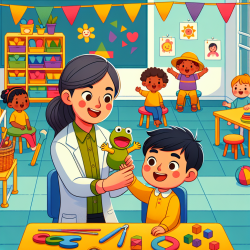As Special Education Directors and practitioners, our ultimate goal is to provide effective and comprehensive support to preschool children facing significant communication difficulties. The complexities of assessing and treating young children with these challenges are well-documented, requiring a nuanced understanding of each child's unique needs and capabilities. Drawing insights from the research article "Evaluating Preschool Children with Significant Communication Difficulties," this blog post aims to offer practical strategies and encourage further exploration into enhancing speech-language pathology practices for this vulnerable population.
One of the primary hurdles in assessing preschool children with communication difficulties is the lack of reliable, standardized assessment tools that capture the breadth and depth of individual communication abilities. The traditional format of a single session evaluation, often conducted in a clinical setting, may not provide a comprehensive view of a child's communicative behaviors. This limitation underscores the need for flexible, varied evaluation approaches that consider the child's comfort and familiarity with the setting and the examiner.
Here are some strategies and considerations for practitioners looking to refine their assessment and intervention practices:
- Adopt a Multi-Session, Play-Based Assessment Approach: As highlighted in the research, transitioning from a single-session assessment to a series of diagnostic sessions can significantly enhance the quality and quantity of information gathered. Incorporating play-based activities across multiple sessions allows children to express their communicative abilities in a more natural and comfortable environment. This approach also facilitates the observation of a broader range of communicative behaviors and interactions.
- Engage in Multidisciplinary Assessments: Collaborating with professionals from various disciplines can provide a more holistic understanding of a child's communication difficulties. Multidisciplinary assessments can reveal underlying factors contributing to communication challenges and inform more comprehensive intervention strategies.
- Emphasize Parent and Caregiver Involvement: Integrating parents and caregivers into the assessment process can offer valuable insights into the child's communication behaviors in different contexts. Encouraging parents to share observations and participate in play-based assessments can enhance the accuracy of the evaluation and strengthen the partnership between practitioners and families.
- Utilize a Variety of Assessment Tools and Environments: To overcome the limitations of standardized tests, practitioners should consider employing a range of assessment tools, including observational checklists, language sampling, and parent-reported measures. Conducting assessments in various settings, such as the child's home or a familiar play area, can also help capture a more representative sample of the child's communicative behaviors.
- Focus on Longitudinal and Normative Research: The research underscores the importance of longitudinal studies and the development of normative data for preschool children with communication difficulties. Practitioners are encouraged to contribute to this body of research by documenting case studies, engaging in follow-up studies, and sharing successful intervention strategies. This collective knowledge can aid in refining assessment techniques, improving prognostic accuracy, and enhancing the effectiveness of intervention programs.
Implementing these strategies requires a commitment to ongoing professional development and a willingness to explore innovative approaches to speech-language pathology. Practitioners should seek out opportunities for continuing education, participate in professional networks, and engage with the latest research findings to stay abreast of advancements in the field.
Moreover, addressing therapist staffing shortages and ensuring legal compliance in special education settings are critical for providing consistent, high-quality support to preschool children with communication difficulties. Special Education Directors play a pivotal role in advocating for resources, facilitating interdisciplinary collaboration, and fostering an environment that supports the professional growth of speech-language pathologists.
In conclusion, the evaluation and treatment of preschool children with significant communication difficulties demand a flexible, child-centered approach that acknowledges the complexity of communicative development. By adopting multi-session, play-based assessments, engaging in multidisciplinary collaborations, and emphasizing parent involvement, practitioners can enhance the quality of care provided to these children. Furthermore, contributing to and utilizing research on longitudinal outcomes and normative data will continue to advance our understanding and improve practices in speech-language pathology.
To delve deeper into the research and methodologies discussed, please follow this link: Evaluating Preschool Children with Significant Communication Difficulties.










